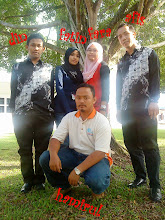Question Heat and Temperature...
1. How many kilocalories of heat must be added to 10.0 kg of steel to raise its temperature 150°C?
Solution :
Data :
m = 10.0kg
ΔT = 150°C
c = 0.115kcal/kg °C
Q = ?
Q = vmΔT
Q = [(0.115)/(kcal/kg°C)](10.0kg)(150°C)
=173kcal
2. What is the specific heat of a substance that absorbs 2.5 x 103 joules of heat when a sample of 1.0 x 104 g of the substance increases in temperature from 10.0C to 70.0C?
Solution :
Q= (m)(Dt)(cp) where q is the energy in joules m is the mass Dt is the change in initial temperature to the final temperature cp is the specific heat (heat required to raise 1 g of the substance 1C)
Q= (m)(Dt)(cp)
2.5 x 103 J = (1.0 x 104 g)(70C-10C)(cp)
[2.5 x 103 J] = cp
[1.0 x 104 g][70C-10C]
0.0042 J = cp
gC
cp = 0.0042J/gC
3. A 1.0 kg sample of metal with a specific heat of 0.50 KJ/KgC is heated to 100.0C and then placed in a 50.0 g sample of water at 20.0C. What is the final temperature of the metal and the water?
Solution :
Qmetal = (m)(Dt)(cp) Qwater = (m)(Dt)(cp)
Qmetal = qwater
(m)(Dt)(cp) = (m)(Dt)(cp)
[1.0Kg][100C-Tf][0.50KJ] = [50.0g][Tf-20C][4.184 J]
[ KgC] [ gC ]
[1.0Kg][1000g][100C-Tf][0.50KJ][ 1Kg][1000J] = [50.0g][Tf-20C][4.184J]
[ 1Kg] [ KgC][1000g][ 1KJ] [ gC ]
[1000g][100C-Tf][0.50J] = [50.0g][Tf-20C][4.184 J]
[ gC] [ gC ]
[1000g][100C-Tf][0.50 J/gC] = [Tf-20C]
[ 50.0g] [4.184 J/gC]
[2.39][100C-Tf] = [Tf-20C]
239C-2.39Tf = Tf-20C
239C + 20C = Tf + 2.39Tf
259C = 3.39Tf
259C = Tf
3.39
76C = Tf
4. A 2.8 kg sample of a metal with a specific heat of 0.43KJ/KgC is heated to 100.0C then placed in a 50.0 g sample of water at 30.0C. What is the final temperature of the metal and the water?
Solution :
Qmetal = (m)(Dt)(cp) Qwater = (m)(Dt)(cp)
Qmetal = Qwater
(m)(Dt)(cp) = (m)(Dt)(cp)
[2.80Kg][100C-Tf][0.43KJ] = [50.0g][Tf-30C][4.184 J]
[ KgC] [ gC ]
[2.8.0Kg][1000g][100C-Tf][0.43KJ][ 1Kg][1000J] = [50.0g][Tf-30C][4.184 J]
[ 1Kg] [ KgC][1000g][ 1KJ] [ gC ]
[2800g][100C-Tf][0.43J] = [50.0g][Tf-30C][4.184 J]
[ gC] [ gC ]
[2800g][100C-Tf][0.43 J/gC] = [Tf-30C]
[ 50.0g] [4.184 J/gC]
[24.08][100C-Tf] = [Tf-30C]
2408C-24.08Tf = Tf-30C
2408C + 30C = Tf + 24.08Tf
2438C = 25.08Tf
2438C = Tf
325.08
97C = Tf
5. How much heat is needed to transform a 1 kg block of ice at –5ºC to a puddle of water at 10ºC?
Solution :
Q = mcΔT
= (1kg)(2.20 x 10³ J/kg°C)(5°C)
= 1.1 x 10^4 J
Q = mfusion
= (1kg)(3.3 x 10^5J/kg)
= 3.3 x 10^5 J/kg
1.1 x 10^4 + 3.3 x 10^5 + 4.2 x 10 ^4 = 3.8 x 10⁶
6. 4190 J of heat are added to 0.5 kg of water with an initial temperature of 12ºC. What is the temperature of the water after it has been heated?
Solution :
ΔT = Q/mc
= (4190 J)/(0.5kg x 4190 J/kg °C)
= 2 °C
7. A 260 g steak is resting on a 200 g glass plate. The initial temperature of the steak is 85 ° C and the initial temperature of the plate is 30 ° C. The heat capacity of the steak is approximately 0.5 J/kg K and the heat capacity of the glass plate is 1.2 J/kg K. Determine the final temperature of the steak/plate system.
Solution :
ms = 260 g
mp = 200 g
Cps = 0.5 J/kg K
Cpp = 1.2 J/kg K
T1,s = 85 ° C
T1,p = 30 ° C
TF = [-(0.260 kg)*(0.5J/kg K)*(358 K) – (0.200 kg)*(1.2J/kg K)*(303 K)]
[-(0.260 kg)*(0.5J/kg K) – (0.200 kg)*(1.2J/kg K)]
TF = 322 K
8. Determine the heat transferred between a 260 g steak resting on a 200 g plate. The thermal conductivity of the steak is 0.49 W/m K and the area the steak covers on the plate is 10 cm2. The thickness of the steak is 3.5 cm. Again the initial temperature of the steak and plate are 85 ° C and 30 ° C respectively.
Solution :
Q = -kA(D T)/( D x)
Q = heat conducted
k = thermal conductivity
A = surface area for conduction
D T = TF – Ti
D x = thickness
k = 0.49 W/m K
A = 10 cm2
D T = TF – Ti = 358 K – 322 K = 36 K
D x = 3.5 cm
A = 0.001 m2
D x = 0.035 m
Q = -[(0.49W/m K)*(0.001 m2)*(36 K)]/(0.035 m)
Q = -0.504 WF
9. A 10.0-lb pieace of hot copper is dropped into 30.0lb 0f water at 50°F. If the final temperature of the mixture is 65°F, what was the initial temperature of the copper?
Solution :
w1 = 10.0lb wg = 30,0lb
c1 = 0.093Btu/lb °F cg = 1.00Btu/lb °F
T1 = ? Tg = 50 °F
c1w1 (T1-Tf) = cgwg (Tf-Tg)
T1 = (cgwg / c1w1)(Tf-Tg) + Tf
T1 =[ (1.00Btu/lb °F )(30.0lb) / (0.093Btu/lb °F)(10.0lb)] (65 °F-50 °F) + 65 °F
= 550 °F
(0.093Btu/lb °F)(10.0lb)( T1- 65 °F) = (1.00Btu/lb °F)(30.0lb)(65 °F-50°F)
0.93T1Btu/°F-60 Btu = 450 Btu
0.93T1Btu/°F =510 Btu
Tl = (510Btu) / (0.93Btu/ °F)
T1= 550 °F
10. A steel railroad rail is 40.0 ft long at 0°F. How much will it expand when heated to 100 °F?
Solution :
l = 40.0 ft ΔT = 100 °F - 0° F = 100 °F
α = 6.5 x 10ˉ⁶ / °F Δl = ?
Δl = αlΔT
Δl = (6.5 x 10 ˉ⁶/°F)(40.0ft)(100°F)
= 0.026ft or 0.31in
Subscribe to:
Post Comments (Atom)

No comments:
Post a Comment